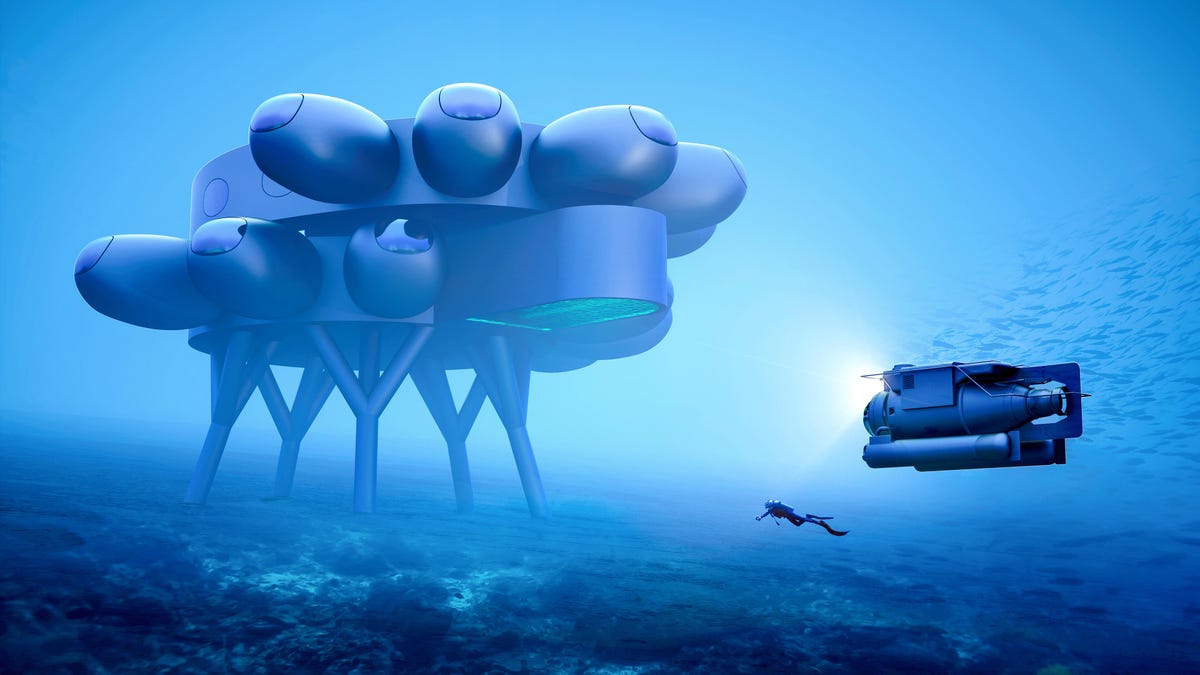 Why You Can Trust CNET
Why You Can Trust CNET Proteus will be an underwater research lab worthy of a Bond villain
Jacques Cousteau's grandson channels some serious sci-fi vibes for an upcoming underwater research lab.

From James Cameron's classic The Abyss, to The Spy Who Loved Me and Sealab 2020 (or 2021, if you prefer), sci-fi has had its share of fascinating underwater bases. But the number of aquatic lairs pales in comparison to the number of fictional orbital and outer space stations we've seen in movies and on TV, mirroring the real-life short shrift that we've given undersea research compared to its extraterrestrial equivalent: More humans have been to the moon than the bottom of Challenger Deep, the deepest point on Earth.
Despite covering over 70% of the planet, very little of the ocean floor has been explored. We've had a permanent habitat in orbit for over 20 years, but only a handful of short-term research stations underwater.
Fabien Cousteau, grandson of the legendary explorer Jacques, has announced plans to change that. Cousteau has pitched a new installation called Proteus and it's designed to become the "underwater version of the International Space Station."
Why an underwater lab?
Underwater research is challenging for a number of reasons, not least of which is time. At best, a person can only stay at depth for a few hours per day. The rest of the day is "wasted" not dying.
If you're not familiar with diving, to survive at any serious depth you're required to breathe compressed air. That's held in the big metal cylinder you see on the back of most scuba divers. Your body reacts differently to this compressed air. It can still process the oxygen just fine, but the nitrogen gets forced into your cells to a far greater extent. This is fine when you're at depth, but when you come up to the surface, that nitrogen expands as the pressure on your body decreases. Ascend too rapidly and it can cause severe, potentially life threatening, issues. Colloquially, this is called the bends.
Three groups of divers hold a mooring line at a 5m decompression safety stop at the end of a dive. Note the air tanks.
The deeper you go, or the longer you stay down, the slower you have to take to get back surface. Alternatively, you'll need to spend hours or in extreme cases days, in a decompression chamber. There are some ways to minimize this, but for the most part, exploration of the seafloor is an extremely time-intensive process. Every minute on the seafloor requires significant decompression time, often several times as many minutes.
Which is to say, being able to stay on the bottom and not having to come to the surface would greatly increase the amount of time spent continually on exploration and research. Instead of a lengthy decompression after each dive, plus the required safety time between dives, people returning from Proteus would just have a single decompression. Less time wasted in transit, so to speak, more time researching on location.
In a single day on Proteus, scientists could do what would have taken days or weeks with multiple, individual dives.
Cousteau and his partners intend Proteus to be a research hub not just for ocean conservation, but for renewable energy research, food production and even medical and drug development. It could also be a good place to test potential Mars-bound astronauts for how well they handle being cut off from society in a hostile environment.
Sealab 2023
The 4,000-square-foot Proteus will be four times larger than any previous underwater station. Researchers will be able to live, eat, and work for weeks at a time. Inside will be research labs, sleeping quarters, a video production studio, and of course a moon pool to get in and out of the water easily. Interestingly, they're also expecting to have a greenhouse, the first of its kind in an underwater station.
Proteus will be able to support up to 12 scientists at a time, not exactly an army of supervillain proportions, but far more than previous stations. That's also twice the complement of the International Space Station, for comparison.
Power will be provided by a mix of sustainable sources, like wind, solar, and ocean thermal. Fresh air, power and internet will be provided by an umbilical cable to the surface.
The plan is to build Proteus off the coast of the Caribbean island of Curaçao, at a depth of 60 feet (~18m).
Though an international project, the main driving force is Fabien Cousteau. In addition to a lifetime and legendary family history of underwater exploration, he is also no stranger to long-term living under the ocean surface. He spent a record 31 days in the 400-square-foot Aquarius Reef Base just off the coast of Key Largo in the Florida Keys in 2014. One of the other big names he's enlisted is Yves Béhar, a name you might recognize from a variety of tech projects like One Laptop per Child. He and his company Fuzeproject designed the futuristic-looking station.
They're joined by the Curaçao government, along with Northeastern and Rutgers universities and the Caribbean Research and Management of Biodiversity Foundation. They hope Proteus will be the first in a group of underwater stations, potentially at even deeper depths.
The Fabien Cousteau Ocean Learning Center aims to finish mapping the site off the coast of Curaçao by September, with the goal to have the habitat built and submerged in 2023.
No word yet on Cousteau's long-term plan on becoming a Bond villain.
As well as covering TV and other display tech, Geoff does photo tours of cool museums and locations around the world, including nuclear submarines, massive aircraft carriers, medieval castles, airplane graveyards and more.
You can follow his exploits on Instagram and Twitter, and on his travel blog, BaldNomad. He also wrote a bestselling sci-fi novel about city-sized submarines, along with a sequel.

